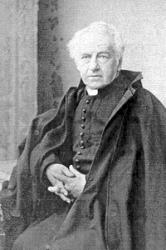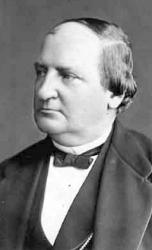Planning worship?
Check out our sister site, ZeteoSearch.org,
for 20+ additional resources related to your search.
- |
User Links
Person Results
William Henry Monk

1823 - 1889 Person Name: W. H. Monk Composer of "[Jesus, meek and gentle]" in Childhood Songs William H. Monk (b. Brompton, London, England, 1823; d. London, 1889) is best known for his music editing of Hymns Ancient and Modern (1861, 1868; 1875, and 1889 editions). He also adapted music from plainsong and added accompaniments for Introits for Use Throughout the Year, a book issued with that famous hymnal. Beginning in his teenage years, Monk held a number of musical positions. He became choirmaster at King's College in London in 1847 and was organist and choirmaster at St. Matthias, Stoke Newington, from 1852 to 1889, where he was influenced by the Oxford Movement. At St. Matthias, Monk also began daily choral services with the choir leading the congregation in music chosen according to the church year, including psalms chanted to plainsong. He composed over fifty hymn tunes and edited The Scottish Hymnal (1872 edition) and Wordsworth's Hymns for the Holy Year (1862) as well as the periodical Parish Choir (1840-1851).
Bert Polman
William Henry Monk
Joseph Barnby

1838 - 1896 Composer of "MERRIAL" in The A.M.E. Zion Hymnal Joseph Barnby (b. York, England, 1838; d. London, England, 1896) An accomplished and popular choral director in England, Barnby showed his musical genius early: he was an organist and choirmaster at the age of twelve. He became organist at St. Andrews, Wells Street, London, where he developed an outstanding choral program (at times nicknamed "the Sunday Opera"). Barnby introduced annual performances of J. S. Bach's St. John Passion in St. Anne's, Soho, and directed the first performance in an English church of the St. Matthew Passion. He was also active in regional music festivals, conducted the Royal Choral Society, and composed and edited music (mainly for Novello and Company). In 1892 he was knighted by Queen Victoria. His compositions include many anthems and service music for the Anglican liturgy, as well as 246 hymn tunes (published posthumously in 1897). He edited four hymnals, including The Hymnary (1872) and The Congregational Sunday School Hymnal (1891), and coedited The Cathedral Psalter (1873).
Bert Polman
Joseph Barnby
Anonymous
Person Name: Unknown Composer of "[Jesus, meek and gentle]" in The Junior Hymnal, Containing Sunday School and Luther League Liturgy and Hymns for the Sunday School In some hymnals, the editors noted that a hymn's author is unknown to them, and so this artificial "person" entry is used to reflect that fact. Obviously, the hymns attributed to "Author Unknown" "Unknown" or "Anonymous" could have been written by many people over a span of many centuries.
Anonymous
J. A. P. Schulz

1747 - 1800 Composer of "[Jesus, meek and gentle]" in Hymns and Songs for the Sunday School Johann Abraham Peter Schulz Germany 1747-1800. Born at Luneburg, Germany, son of a baker, he attended St Michaelis school in Luneburg and studied organ, then the Johanneum from 1759-1764. In 1765 he was a student of composer, Johann Kimberger, and then taught in Berlin himself. In 1768 Kimberger recommended Schulz for the position of music teacher and accompanist to the Polish Princess Sapieha Woiwodin von Smolensk. Schulz moved to Berlin and traveled with her for three years performing throughout Europe, where he came in contact with many new musical ideas. He married Catharina Maria Gercken, and they had a daughter, Celle. He served as the conductor of the French Theatre in Berlin from 1776-1780. From 1786-1787 he was the Kapellmeister of Prince Henry in Rheinsberg. He began writing operas in 1785 and became musical director of the Berlin French theatre. Schulz went on to serve as Court Kapellmeister in Copenhagen from 1787-1795 before returning to Berlin. In Copenhagen the music library burned down, and he had a breakdown in health from trying to save it. His health suffered further from the effects of a shipwreck he experienced in 1796. Schulz wrote seven operas, stage music, oratorios, and cantatas, as well as piano pieces, folk songs, and church music. He also wrote articles on music theory for Johann Georg Sulzer’s ‘Allgemeine Theorie der schonen Kunste’ in four volumes. He died at Schwedt an der Oder, Germany.
John Perry
J. A. P. Schulz
Samuel W. Beazley

1873 - 1944 Person Name: Samuel W. Beazley, 1873- Composer of "KENMORE" in The Baptist Standard Hymnal Samuel W. Beazley was born in Sparta, Virginia in 1873. He was a music scholar and taught music at Shenandoah College for five years. He composed over 4,000 gospel songs during his lifetime. Samuel W. Beazley maintained a successful publishing business in Chicago, Illinois. He died in Chicago on September 16, 1944. He was inducted into the Gospel Music Hall of Fame in 1992.
NN, Hymnary editor. Source: www.gmahalloffame.org
Samuel W. Beazley
Charles C. Converse

1832 - 1918 Person Name: C. C. Converse Composer of "[Jesus, meek and gentle]" in Songs of the Covenant Pseudonyms: Clare, Lester Vesé, Nevers, Karl Reden, Revons
=================================
Charles Crozat Converse LLD USA 1832-1918. Born in Warren, MA, he went to Leipzig, Germany to study law and philosophy, as well as music theory and composition under Moritz Hauptmann, Friedrich Richter, and Louis Plaidy at the Leipzig Conservatory. He also met Franz Liszt and Louis Spohr. He became an author, composer, arranger and editor. He returned to the states in 1859 and graduated from the Albany, NY, Law School two years later. He married Lida Lewis. From 1875 he practiced law in Erie, PA, and also was put in charge of the Burdetta Organ Company. He composed hymn tunes and other works. He was offered a DM degree for his Psalm 126 cantata, but he declined the offer. In 1895 Rutherford College honored him with a LLD degree. He spent his last years in Highwood, NJ, where he died. He published “New method for the guitar”, “Musical bouquet”, “The 126th Psalm”, “Sweet singer”, “Church singer”, “Sayings of Sages” between 1855 and 1863. he also wrote the “Turkish battle polka” and “Rock beside the sea” ballad, and “The anthem book of the Episcopal Methodist Church”.
John Perry
Charles C. Converse
Friedrich Filitz
1804 - 1876 Person Name: F. Filitz Composer of "DERBY" in The Endeavor Hymnal Friedrich Filitz PhD Germany 1804-1876. Born at Arnstadt. Thuringia, he was a German composer and musicologist. He collected church music. He also studied philosophy. In 1833 he worked in Berlin as a music critic and at other employment. He was also a music historian. With Ludwig Erck, he published a collection of 15th & 17th Century chorales in 1845. He moved to Munich and published a chorale book in 1847. His legacy of vauable church music was donated to the Bavarian State Library, where it has made many forgotten works available once again. He died in Bonn, Germany.
John Perry
Friedrich Filitz
George Rundle Prynne

1818 - 1903 Person Name: Rev.. G. R. Prynne Author of "Jesus, meek and gentle" in The Hymnal, Revised and Enlarged, as adopted by the General Convention of the Protestant Episcopal Church in the United States of America in the year of our Lord 1892 George Rundle Prynne studied at S. Catherine's College, Cambridge, where he graduated B.A. 1839, M.A. 1861. He was ordained Deacon in 1841, and Priest in 1842. He afterwards became Curate of S. Andrew's, Clifton, and entered upon his present incumbency of S. Peter's, Plymouth, in 1848. He has published some sermons and manuals.
--Annotations of the Hymnal, Charles Hutchins, M.A. 1872.
================
Prynne, George Rundle, M.A., son of John Allen Prynne, was born at West Looe, Cornwall, Aug. 23, 1818, and educated at St. Catherine's College, Cambridge, B.A., 1839; M.A. 1861. He took Holy Orders in 1841, and became Vicar of St. Peter's, Plymouth, in 1848. He has published Parochial Sermons, 1846; Plain Parochial Sermons, 1856; another series, 1876; The Dying Soldier's Visions, and Other Poems and Hymns, 1881, &c. He also published Hymnal suited for the Services of the Church, 1858. His most popular hymn is “Jesu, meek and gentle,” p. 591, ii. His hymns "The day is done; O God the Son" (Evening), and "Thy glory fills the heavens" (The Glory of the Father), have also been included in a few collections. He died Mar. 25, 1903.
--John Julian, Dictionary of Hymnology (1907)
George Rundle Prynne
Martin Shaw

1875 - 1958 Composer of "BELSIZE" in Songs of Praise Martin F. Shaw was educated at the Royal College of Music in London and was organist and choirmaster at St. Mary's, Primrose Hill (1908-1920), St. Martin's in the Fields (1920-1924), and the Eccleston Guild House (1924-1935). From 1935 to 1945 he served as music director for the diocese of Chelmsford. He established the Purcell Operatic Society and was a founder of the Plainsong and Medieval Society and what later became the Royal Society of Church Music.
Author of The Principles of English Church Music Composition (1921), Shaw was a notable reformer of English church music. He worked with Percy Dearmer (his rector at St. Mary's in Primrose Hill); Ralph Vaughan Williams, and his brother Geoffrey Shaw in publishing hymnals such as Songs of Praise (1925, 1931) and the Oxford Book of Carols (1928). A leader in the revival of English opera and folk music scholarship, Shaw composed some one hundred songs as well as anthems and service music; some of his best hymn tunes were published in his Additional Tunes in Use at St. Mary's (1915).
Bert Polman
Martin Shaw
Franz Abt

1819 - 1885 Composer of "[Jesus, meek and gentle]" in Rodeheaver Collection for Male Voices Franz Abt, born Dec. 21, 1819 at Eilenburg in the Prussian provinces of Saxony. His father was a musician and clergyman of the Lutheran Church. Franz studied music at Leipsic, and became known as a song-writer in 1838. In September, 1841, he married, and was leader of the orchesta at the Zuric theatre; became a teacher in 1842, but was litle known until his song "When the Swallows Homeward fly" carried his name to all parts of the civilized world. In 1865 was concert-master at Brunswick, and conducted the great festival at Dresden. He came to the United States in 1872, and was present at teh Peace Jubilee, Boston, where he directed the performance of some of his own music, arriving in New York May w, wher a testimonial concert was given for his benefit at Steinway Hall, May 18. He was received at Philadelphia by the German societies, with torch-light processions and cannonade, May 15, 1872.
A Dictionary of Musical Information by John W. Moore, Boston: Oliver, Ditson & Company, 1876
Franz Abt


 My Starred Hymns
My Starred Hymns


